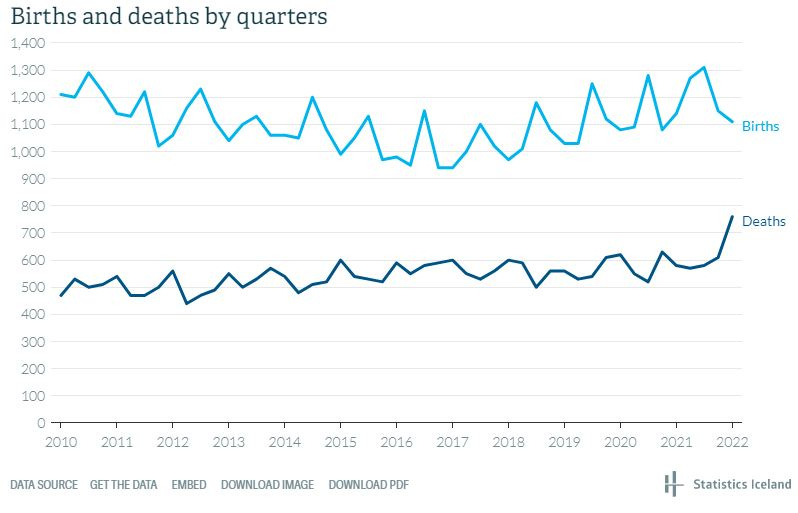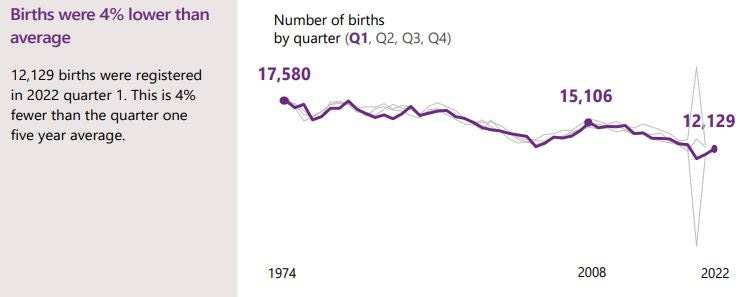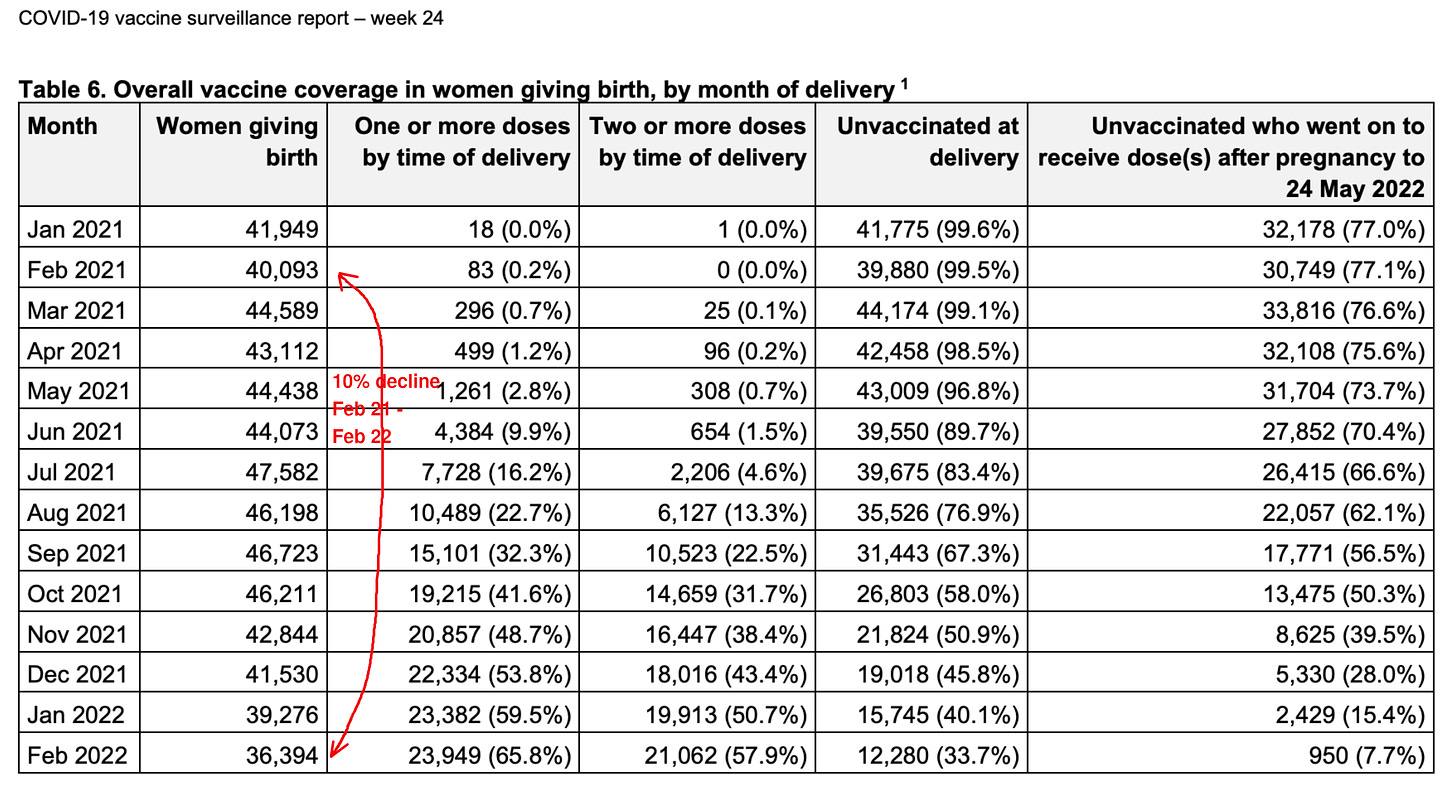Over the last week I seem to have spent rather a large amount of time wading through charts and data-sets on births across various countries. To be specific, the birth rates reported in the first quarter of 2022 by various governmental bodies.
Really, I just wanted to collate and share, adding some thoughts of my own along the way. I will, however, try and keep more philosophical and conspiratorial ruminations to the minimum.
The first graph I came across reporting a rapid decline in first quarter births came out of Germany here:
German officials have acknowledged the massive decrease in births but, naturally, they’re opposed to any speculation that the cause is vaccine related. What I find interesting is the modest increase in births for 2021. At the beginning of the Covid saga some commentators speculated that we may actually witness something of a ‘‘Baby Boom’’ due to couples being off work with not much to do at home but, well, amuse themselves.
The Federal Office for German statistics has claimed this slight bump in the birth-rate is the reason for the dramatic fall in 2022—that couples have had their children and are now content. Make of that what you will.
In December 2021 National Geographic carried a gushing article celebrating the pandemic Baby Boom called ‘‘The pandemic delivered a surprise to Nordic countries: a baby boom’’
Since the COVID-19 pandemic began, births in many wealthy countries across the world have plummeted. In 2020 the United States’ fertility rate cratered at its lowest ever, Chinese births plunged 15 percent, and France saw the fewest babies born since World War II. Meanwhile, the Nordic countries—Denmark, Norway, Sweden, Finland, and Iceland—all have maintained their birthrates, and some are puzzled to find themselves in the midst of a pandemic baby boom.
National Geographic makes specific mention of Iceland’s increased birth-rate and as we can see here, they were not incorrect:
Iceland did indeed enjoy a baby boost during the pandemic with a decrease setting in now. However, it’s worth pointing out that most nations have a clear seasonal birth-rate with more babies being conceived in the long winter months and fewer in the first quarter of the year. It is at the end of ‘‘Q1’’ that we usually begin to see an upturn in births. This has not (thus far) materialized in Iceland but as we can see, it would not be the first time. In short, then, it’s too early to see any long term trends.
Why Iceland is also dealing with their highest rate of deaths ever recorded is anyone’s guess….
The data coming out from Sweden is far less vague:
Here we can see that the usual Q1 increase in births has hardly materialized at all. Furthermore, Sweden is an outlier due to it being one of the very few nations which did not enact lockdowns. Swedes were free to work, socialize and carry-on almost as normal and so the drop in births can hardly be attributed to the stress and general upheaval and insecurity those conditions could ‘‘possibly’’ have resulted in elsewhere.
Scotland reported 4% fewer births in the first quarter of 2022:
And the timeline of vaccination can be seen here
The UK’s Covid-19 vaccine surveillance report reveals that total births dropped by almost 10% when compared to the same period last year.
I could go on. Switzerland’s stats look similar to Germany’s, Hungary is weighing in at -20% and Taiwan at -23%. Hungary has seen something of a boost but they’ve also taken in a more than a million women and children from Ukraine, which perhaps made a difference.
So it’s clear that many countries, but by no means all, are reporting drastic decreases in births for the first quarter of 2022.
As I see it there are a few explanations for this decline that can be put forward but non of them reveal the Covid policies of world leaders and institutions as anything other than catastrophic. If we write-off this sudden drop as being a form of collateral damage resulting from economic pressures, stress, fear of the virus itself and the social cost of lockdowns, then we can at least expect a rise in births in the months ahead.
Sweden and the Nordic ‘‘Baby Boom’’ celebrated by the National Geographic are of course rather inconvenient here, perhaps the Nat-Geo can publish another article explaining why the Nordic Boom suddenly crashed at the beginning of 2022, or starting nine months after the vaccine roll-out.
However, as I stated at the beginning of this article, we simply do not yet know how this will develop and we must tread with caution. It is perfectly possible that when the Q2 and Q3 births are released we’re going to witness a significant increase.
My fear, however, is that the data we have so far only takes us to the beginning of the vaccine roll-out. If the vaccine is responsible for this decline then what will that look like when we add in second doses and boosters to the mix?
It remains to be seen.
All that being said, I keep thinking back to the very beginning of the vaccine roll-out and the many women who were quietly expressing concern about how odd their menstrual cycle was erratic and ‘‘messed-up’’ post-injection. They were ignored, of course.
Links:
https://coronavirus.data.gov.uk/details/vaccinations?areaType=nation%26areaName=Scotland
https://www.nrscotland.gov.uk/files/statistics/births-marriages-deaths-quarterly/22/q1/quarter-1-22-report.pdf
https://www.nationalgeographic.com/history/article/the-pandemic-delivered-a-surprise-to-nordic-countries-a-baby-boom
https://www.statice.is/publications/news-archive/inhabitants/population-in-the-1st-quarter-2022/













It's difficult to try and relate the national-level or age-cohort level vaccine uptake data to pregnancies, stillbirths and miscarriage data, as the uptake rate among pregnant women may be substantially different to their age cohort. In the UK, when my wife became pregnant last year, pregnant women were advised not to take the vaccines at first. She never did, as neither of us trusted something so novel. However by late summer 2021 there was a lot of pressure from the NHS to take the covid vaccine if pregnant (although we found that individual midwives would dissent from this in private consultation, and a consultant we saw told us that not taking the jab was a smart choice given our low risk from the virus, assuming we were okay with the travel implications (!) of not getting it).
Our baby daughter was born this spring and is healthy. I hope that she ends up marrying someone who hasn't been mRNA-inoculated, if there is any long term effect from this.
I warned everyone that the most vaccinated are rural whites and white native Europeans in general.. we will be a minority in Britain before 2030 and that's with half the population total aswell.